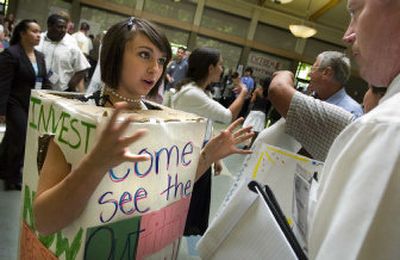Trade fair teaches teens

A future generation of CEOs and marketing gurus transformed Gonzaga University’s Cataldo Hall into a trade show on Friday.
High school students from around the state touted the financial viability of mock companies, while presenting invented goods and services to a panel of nearly 50 businesspeople.
Products ranged from the practical, like the Garbaliser deodorizing strip – which takes the stench out of garbage – to the futuristic Hoverpak 9.0, a remote-control backpack with a levitation device and built-in massager to eliminate back pain.
“This was a great group this year. The product mix this year is really diverse,” said Susan Matteson, an owner of Peters & Sons Flowers, Gifts and Gallery. She has volunteered as a judge for the past three years.
The show culminated a weeklong Washington Business Week camp, co-sponsored by Gonzaga and the Association of Washington Business. Kids used some set assumptions regarding mock companies, then created marketing programs and put together balance sheets and growth charts for those businesses. The camp has been offered for about 30 years and held at Gonzaga for 24 years.
Judges from Pemco Insurance, Safeway, U.S. Bank and other businesses each received nearly $1 million in play money to invest in any of over a dozen companies. Six businesses met their fund-raising goals. The winner of the trade show competition – Company J – raised $4.7 million.
Tastefully dressed teenagers wowed the judges with their professional demeanor while sending them in the direction of booths that displayed graphics and marketing ploys designed to convince the potential investors that their companies were sound. Some had a tougher road than others.
The group running Focus Inc., for example, inherited a company that supposedly had experienced flood damage that shut down production and sent its stock plummeting. Focus Inc. reps were hoping their new product – stickers with electronic chips to track things – would end the stock’s slump.
Stacy Sainsbury, a Freeman High School sophomore pitching the electronic stickers, said she learned about investing money at the weeklong camp.
Another Freeman student, Ty Thomas, a junior, noticed how the investors were scrutinizing the companies.
“If you’re too new they worry about whether or not the business is going to work,” Thomas said.
Rachel Anderson, a senior at Rogers High School, walked away with some practical lessons. “Even if you’re not a business student you learn to manage your money well,” she said.
Steve Hyer, executive director of Washington Business Week, said the camps are supported by businesses throughout the state. Companies pay the bulk of tuition, which costs $875 per student. Families pay $295 or less, depending upon their financial circumstances.
The main goal of the project, Hyer said, is to get teenagers to appreciate the link between education and their futures. But the camps also help kids recognize possibilities and build skills, Hyer said. “It’s important for the business community to take responsibility for the next generation of employees,” he said.
“If the kids come out of this with a step up in self-confidence, when the next opportunity comes along they’re going to take it.”